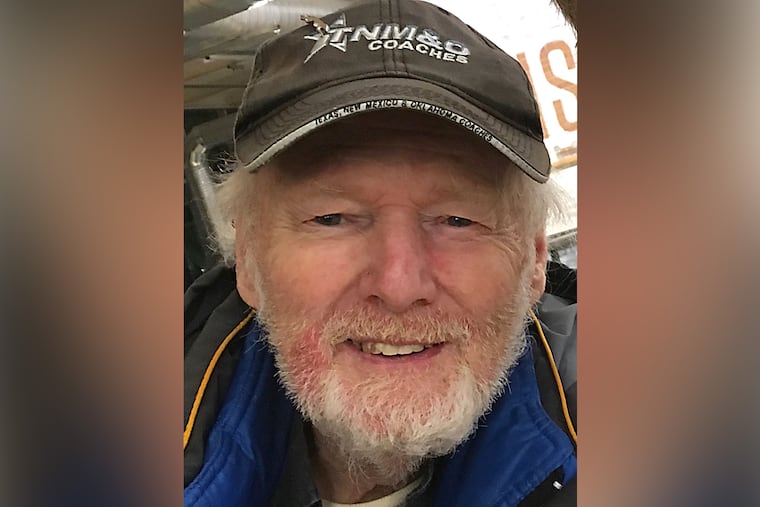William Eisenhuth, pioneering advocate for homeless people and those who were mentally ill, has died at 87
“Bill was one of the pioneers,” said Sister Mary Scullion, director of Project HOME and one of the region’s chief advocates for homeless people.

William Eisenhuth, 87, of Havertown, an advocate for those who suffered from mental illness, especially homeless people; a man of faith who spurred others to fight for policy change; and an outspoken activist who spent countless nights providing comfort to people living on the streets even at the end of his life, died Tuesday, Jan. 17, from complications of COVID-19 at Bryn Mawr Hospital.
Just a month before his death, Mr. Eisenhuth celebrated his birthday distributing blankets to homeless people with his son, Keith. In fact, he wanted to go out another night with more blankets; he never felt he had done enough.
“Bill was one of the pioneers,” said Sister Mary Scullion, director of Project HOME and one of the region’s chief advocates for homeless people. “He was a very authentic human being, and we stand on his shoulders.”
Mr. Eisenhuth, from an early age, felt a deep compassion for people many others ignore. When he was a young teen, he rode his bicycle from Upper Darby, where he lived, to the state mental hospital in Norristown to talk to the people “behind the fence,” he later told his wife of 39 years, Annette. Eventually, one of the doctors took him on as a volunteer.
Mr. Eisenhuth’s own early life was hard, said his wife. With problems at home, he spent a lot of time as a youngster at Upper Darby’s 69th Street transit center where he was befriended by the Greyhound bus staff and drivers. As an adult, he worked for the company at times, and was known to friends as Greyhound Bill.
But serving people with mental illness, including struggling youth, was his mission. Working both as a volunteer and in paid positions, he built a career working at various mental-health hospitals, shelters, and institutions. He didn’t earn his bachelor’s in psychology until 1980, his wife said. But his work and responsibility often far exceeded his academic credentials.
Harold Knudsen, a psychologist now retired from the state system, was Mr. Eisenhuth’s supervisor at Philadelphia State Hospital at Byberry in the 1970s. Mr. Eisenhuth started as a volunteer, but Knudsen hired him despite his lack of educational qualifications.
“He was able to relate to the patients in a way that a lot of people could not do,” Knudsen said. “It was one of his gifts.”
Mr. Eisenhuth and Knudsen created a volunteer program that brought local high school and college students into Byberry as volunteers to spend time with patients who rarely had visitors. Mr. Eisenhuth went on to other positions at several institutions and programs, and the two men remained friends over 50 years.
In the ‘80s, cities like Philadelphia were discharging large numbers of people suffering from mental illness from psychiatric centers to less restrictive, community-based care. But that community-based system to a large extent never truly materialized, and many people ended up living on the streets.
Mr. Eisenhuth, who had been serving the afflicted in institutions and in communities for years, became one of the region’s most passionate spokespeople for the voiceless.
He founded the Advocates for the Mentally Disabled, a small but active group of activists, and was often quoted by media outlets. In one popular television news show, he called the government’s treatment of people with mental illness a “subtle form of genocide.”
In that show, he was filmed, as he did many nights, offering comfort to people sleeping on sidewalks and doorways of Philadelphia.
Ronald Comer, a fellow activist, said Mr. Eisenhuth’s advocacy hada lasting impact, including on Comer, who went on to start the behavioral health counseling major at Drexel University’s College of Nursing and Health Professions.
“There are people out there doing Bill’s work now,” Comer said.
In the 1980s, Mr. Eisenhuth was given several awards for his work, including an honorary doctorate from Villanova University, a Benjamin Rush Award, and a state accolade for his work training police.
One of his proudest moments, according to his wife, was getting baptized a Catholic at age 56 along with his baby son.
To help provide more security for his family, Mr. Eisenhuth sought other paid work, including driving a school bus and working for Amtrak. But he would still spend many nights offering people experiencing homelessness whatever comfort he could: food, coffee, or blankets bought with his own money.
His wife said one of the last things he uttered before he died was, “Can you imagine all the people dying alone on the streets like this?”
In addition to his wife and son, Mr. Eisenhuth is survived by a grandson and other family members. A brother died earlier.
A funeral Mass was held Jan. 27.
Donations in his name may be made to Project Home, Outreach, c/o Carol Thomas, or to the Treatment Advocacy Center.